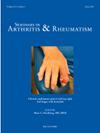Effectiveness of patient education on the quality of life of patients with rheumatoid arthritis: A systematic review and meta-analysis
IF 4.6
2区 医学
Q1 RHEUMATOLOGY
引用次数: 0
Abstract
Background
Rheumatoid arthritis (RA) has a considerable negative impact on quality of life (QoL) and represents a significant burden on healthcare systems worldwide. Although patient education (PE) programs are advocated as an integral component of comprehensive RA management, the magnitude and sustainability of their QoL benefits remain unclear. This meta-analysis seeks to assess the efficacy of PE interventions in enhancing QoL among RA patients.
Methods
A comprehensive review of studies from 1985 to 2022 was conducted, incorporating 66 publications (59 randomized controlled trials and 7 non-randomized controlled trials) with a total of 9622 participants. Studies were selected based on predefined inclusion criteria, focusing on adults diagnosed with RA who participated in PE interventions compared to conventional or no interventions. Data were analyzed using fixed-effect and random-effects models, depending on the heterogeneity among studies. Results were reported separately for the initial follow-up and for the final follow-up.
Findings
PE interventions demonstrated a positive impact on QoL. Following the intervention, there is a significant improvement in QoL (SMD = 0·13, 95% CI: 0·08 to 0·17, I² = 43%), with the highest efficacy observed at 7–12 weeks. Modern-era publications and randomized controlled trials offer more consistent results. Subgroups with higher female representation (>85%) and combined intervention approaches show more substantial effects. In the final assessments, QoL improvements are noteworthy, especially within the 0–6 weeks post-intervention period (SMD = 0·39, 95% CI: 0·13 to 0·66, I² = 84%). Younger adults (≤50 years) benefit the most, while longer program durations (>52 weeks) exhibit significant but varied effects.
Interpretation
This meta-analysis underscores the positive effect of PE interventions on QoL among RA patients, highlighting the importance of tailored approaches considering various contextual factors. Standardizing intervention protocols and optimizing delivery methods are recommended to enhance the sustained impact of PE programs in RA management.
患者教育对类风湿关节炎患者生活质量的影响:系统回顾与荟萃分析
背景类风湿性关节炎(RA)对生活质量(QoL)有相当大的负面影响,是全球医疗保健系统的重大负担。尽管患者教育(PE)项目被认为是类风湿关节炎综合管理不可或缺的组成部分,但其对生活质量益处的程度和可持续性仍不明确。本荟萃分析旨在评估PE干预措施在提高RA患者QoL方面的疗效。方法对1985年至2022年的研究进行了全面回顾,纳入了66篇出版物(59项随机对照试验和7项非随机对照试验),共有9622名参与者。研究根据预先确定的纳入标准进行筛选,重点关注参与PE干预与常规干预或不参与干预的确诊为RA的成人。根据研究间的异质性,采用固定效应和随机效应模型对数据进行分析。研究结果PE干预对QoL有积极影响。干预后,QoL 有明显改善(SMD = 0-13,95% CI:0-08 至 0-17,I² = 43%),7-12 周时疗效最高。现代出版物和随机对照试验提供了更为一致的结果。女性比例较高的亚组(85%)和综合干预方法显示出更大的效果。在最终评估中,QoL 的改善值得关注,尤其是在干预后的 0-6 周内(SMD = 0-39,95% CI:0-13 至 0-66,I² = 84%)。这项荟萃分析强调了PE干预对RA患者QoL的积极影响,突出了考虑各种环境因素的定制方法的重要性。建议规范干预方案并优化实施方法,以增强PE项目在RA管理中的持续效果。
本文章由计算机程序翻译,如有差异,请以英文原文为准。
求助全文
约1分钟内获得全文
求助全文
来源期刊
CiteScore
9.20
自引率
4.00%
发文量
176
审稿时长
46 days
期刊介绍:
Seminars in Arthritis and Rheumatism provides access to the highest-quality clinical, therapeutic and translational research about arthritis, rheumatology and musculoskeletal disorders that affect the joints and connective tissue. Each bimonthly issue includes articles giving you the latest diagnostic criteria, consensus statements, systematic reviews and meta-analyses as well as clinical and translational research studies. Read this journal for the latest groundbreaking research and to gain insights from scientists and clinicians on the management and treatment of musculoskeletal and autoimmune rheumatologic diseases. The journal is of interest to rheumatologists, orthopedic surgeons, internal medicine physicians, immunologists and specialists in bone and mineral metabolism.

 求助内容:
求助内容: 应助结果提醒方式:
应助结果提醒方式:


